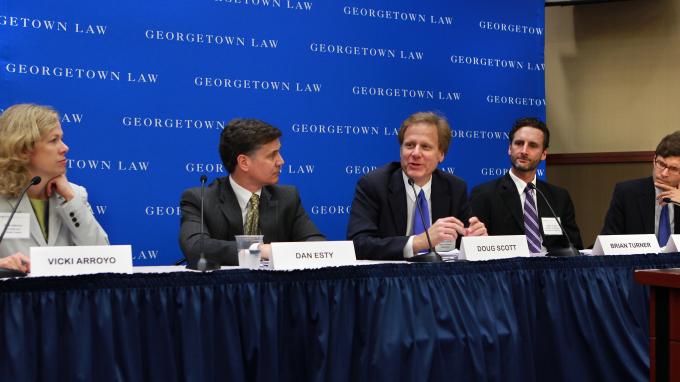
Photo courtesy of Georgetown University.

Photo courtesy of Georgetown University.
Washington, DC
United States
Transportation and climate policy. Bridging the divide between these often conflicting subjects has been a focus of elected officials and policy experts for decades. Helping facilitate this critical dialogue today is the nonprofit, nonpartisan Georgetown Climate Center (GCC), launched by the Georgetown University Law Center in Washington, D.C. in February 2009.
The GCC’s overarching goal is to advance climate, energy, and transportation policies throughout the United States. The organization works to reduce greenhouse gas emissions while helping states and communities adapt to climate change.
“We are the first and only climate and energy institute in the country that operates at the nexus of state and federal law and policy, and that strives to strengthen state-federal climate partnerships,” said Vicki Arroyo, Georgetown Climate Center executive director and Visiting Professor, Georgetown Law.
Since the GCC’s inception, the Rockefeller Brothers Fund has supported the group’s core work. The organization works extensively with an array of stakeholders to help identify how each state can enhance climate change initiatives through the sharing of best practices, innovation, and insights on policy design and implementation.
Partnering with states and U.S. territories that support comprehensive federal climate and energy legislation, the GCC serves as the convener of the Governors’ Energy and Climate Coalition. “Our goal is to build on state innovation, including emissions reduction policies, energy efficiency, renewable energy, transportation, and adaptation efforts through comprehensive federal action,” said Arroyo.
The GCC is currently working with the Pew Center on Global Climate Change and the World Resources Institute, an RBF grantee, to bring together representatives from the three regional U.S. climate initiatives: The Regional Greenhouse Gas Initiative, the Western Climate Initiative and the Midwest Greenhouse Gas Reduction Accord. In particular, the GCC is facilitating the groups’ discussions about potentially linking their three emissions trading programs.
“The Rockefeller Brothers Fund continually provides the Georgetown Climate Center with invaluable support – both financial and strategic,” says Arroyo. “RBF’s leadership led to the creation of the Center and has enabled the GCC to serve as a key resource in the development of climate policy at the state and federal level.”
The GCC will continue to work with the states on federal policy developments. The GCC is poised to evaluate climate, energy, transportation, and adaptation legislation and will conduct quantitative analysis of allocation distribution and other mechanisms for distributing funds to states. The link with Georgetown Law provides the ability to provide legal analysis and support to the states, as well.
“States have served as leaders in climate and energy policy for years,” said Arroyo. “As the federal government explores options for addressing greenhouse gases nationally, it is critical that states be allowed to continue this leadership role.”
The Georgetown Climate Center is a project of The President and Directors Georgetown College (Georgetown University).
Our online database includes grants made by the Rockefeller Brothers Fund over the past five years.